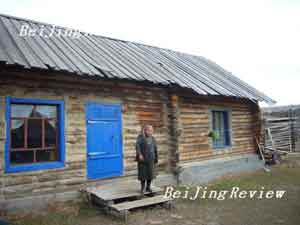
Next to the Kanas Lake "monster," to many people the Tuvans are the second most mysterious inhabitants of the Kanas region in northern Xinjiang Uygur Autonomous Region. The Tuvans, however, actually are one of the oldest nomadic peoples in northwest China.
The Kanas region is the only place in China that is home to the Tuvans, who number 2,000 and mainly live in three villages around the Kanas Lake. There are about 200,000 Tuvans worldwide, with 30,000 living in Mongolia and the rest mainly in the Republic of Tuva, which is part of the Russia.
"We belong to the Mongol [tribe] and every Tuvan here considers Genghis Khan our hero," said Buhedi, a 65-year-old resident of Hemu Village, one of the three villages of the Tuva in China. Tuvans believe they are descendants of Mongol troops, and they honor Genghis Khan by hanging a portrait of him on the wall of their wooden houses.
But the origin of the Tuvans remains a mystery. Some experts think that the Tuvans in China migrated from the Republic of Tuva 500 years ago but others argue that they are a branch of the Mongols as they are believed to be the offspring of the troops of Genghis Khan as he conducted his campaign of conquest.
Tuvans believe in Tantric Buddhism and have preserved the traditional beliefs of their tribe quite well. Religious and traditional festivals are always jolly and active.
For almost 500 years, the Tuvans lived in a picturesque and peaceful region generation by generation, separated from the outside world and undisturbed.
In the mid-1990s, however, Hemu Village began to open up to the outside world and tourism was introduced. Wooden cabins were rented to the tourists, horses were trained to carry the backpackers and rustic food and drink were served to the increasing number of visitors.
Profiting from tourism
Not long after, the tourism economy overtook the traditional agro-pastoral economy and became the main income source for the Tuvans. The per capita income rose to 1,900 yuan last year in Hemu Village, with tourism revenue accounting for 52 percent of the total, while in 1993, the average income was merely 356 yuan, according to Gerelit, the village's deputy chief.
But the 1,900 yuan income in Hemu is low compared with that of Kanas Village, another area of the Tuva in China. Kanas Village started its tourism business a little earlier than Hemu Village and its per capita income reached 4,200 yuan in 2005, with 67 percent coming from tourism, according to the village's official statistics.
"Tourism brings a lot of benefit to the local Tuva residents," said Gerelit. "The most important result is that our income is increased, as is our livelihood. The quality of our people is also enhanced."
The deputy chief's house provides evidence for that assertion. The house is spacious and tidy, with large, delicate carpets covering the wooden floor. In one corner is a big-screen color TV.
Gerelit also mentioned the environmental problems that tourism causes. "Rubbish can be found along the road and the riverside," he said. "But compared with the good results tourism has brought to us, such a problem so far hasn't posed any serious threats to our natural environment and we already have this under control."
In Kanas Village, however, the tourism business has grown a bit too fast and in recent years complaints from tourists have mounted, focusing on the shabby lodging and dining facilities.
Therefore, starting this year, most of the tourism establishments are being dismantled to protect the environment of the Kanas region. As compensation, every Tuvan household in Kanas Village will receive 20,000 yuan every year for five consecutive years. The money comes from ticket sales to the Kanas scenic area. In addition, the scenic area has employed 116 Tuvans to be forest guards, custodians and providers of other services.
Given all these measures, the total income of the 110 Tuvan households each year will come to 4 million yuan, 1 million yuan more than in the past, when the villagers rented houses and provided food for the visitors.
According to various tales, Tuvans are also famous for their alcohol consumption. But when asked about it, Gerelit, the deputy chief, had a quick response. "Don't believe that," he commented to Beijing Review. "Suppose we Tuvans were all alcoholics and went around with a bottle of wine in hand all day long; who do you think put up so many wooden cabins and fences and raised these horses?"
What has changed along with the economic pattern is the honest and simple ways of the people. One reporter complained that he was welcomed in a Tuvan family with milk tea and local pastries, which he thought was free, but when he was about to leave he was charged 45 yuan for the food and drink.
"I was pretty surprised and felt awkward about this, but it seems that free hospitality is a thing of the past already," said the reporter. | 